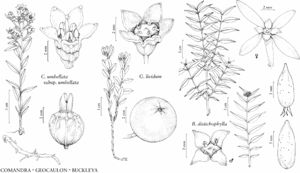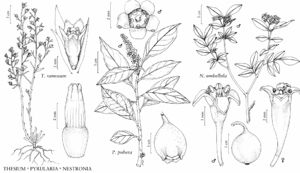Thesiaceae
Herbs or shrubs, perennial [annual], root parasites, deciduous, synoecious or dioecious. Leaves opposite, subopposite, or alternate, simple; stipules absent; petiole present or absent; blade margins entire or minutely serrulate; venation pinnate. Inflorescences unisexual or bisexual, terminal or axillary, cymes (sometimes umbel-like) or thyrses, or flowers solitary. Flowers bisexual or unisexual; perianth and androecium epigynous; hypanthium completely adnate to ovary, adnate to ovary proximally but free distally, or absent; sepals 0 or 4, distinct, valvate; petals 4–5, distinct [connate], valvate, post-staminal hairs present or absent; nectary present [absent]; stamens 4–5, opposite petals, distinct, free [adnate to petal bases]; anthers dehiscing by longitudinal slits; pistil 1, 3–4-carpellate, ovary inferior, 1-locular, placentation free-central, pendulous; ovules 2–4 per locule, anatropous; style 1; stigma 1. Fruits pseudodrupes (mesocarp hard, exocarp leathery or fleshy). Seeds 1 per fruit.
Distribution
Nearly worldwide.
Discussion
Genera 4, species ca. 370 (2 genera, 2 species in the flora).
The assemblage of genera comprising Thesiaceae received strong support from molecular phylogenetic analyses (J. P. Der and D. L. Nickrent 2008; Nickrent and M. A. García 2015). Buckleya is sister to the remaining genera, which are either endemic to or have their center of diversity in Africa. Because Buckleya occurs in eastern North America and Asia, the ancestor to the remaining genera apparently migrated to Africa prior to diversification.
Selected References
None.

